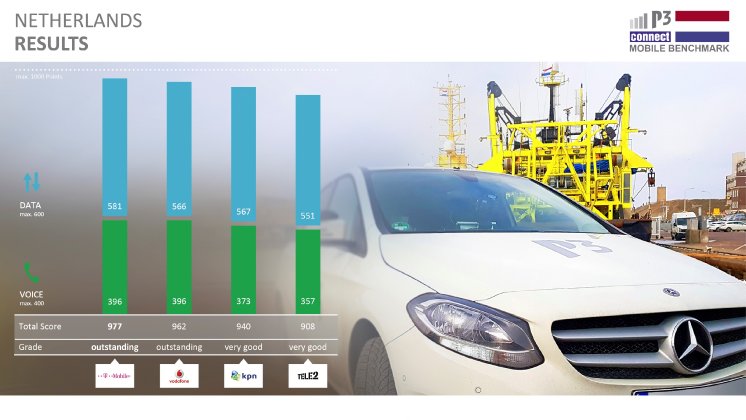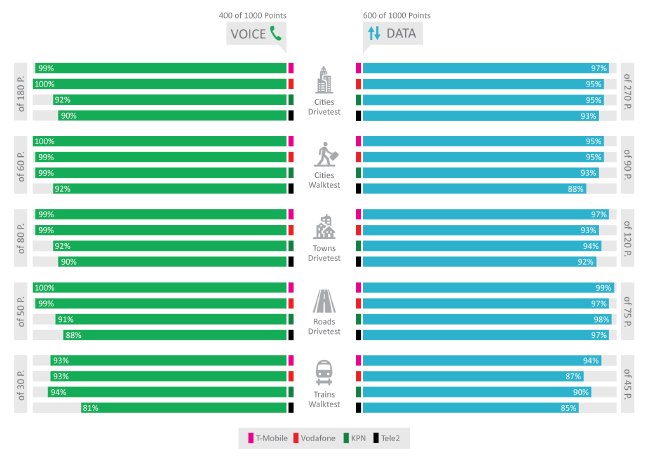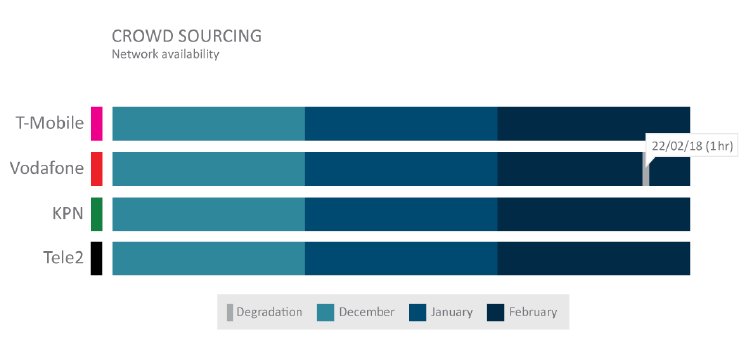The P3 connect Mobile Benchmark in The Netherlands has tested the four Dutch networks - KPN, Tele2, T-Mobile NL and Vodafone - using a highly sophisticated range of measurements across 21 large cities, 31 smaller towns and along 3,600 kilometres of major roads. Also, walktests were conducted as well as tests on railways. It is the fourth benchmark by P3 and connect in The Netherlands, while P3 and connect have been testing the mobile networks in Germany, Austria and Switzerland for 15 years. Apart from The Netherlands, the benchmarking activities of the partners were extended to the United Kingdom, Spain, Sweden and Australia within the past few years.
T-Mobile wins overall with a clear lead in data and outstanding 977 points
With an overall grade of "outstanding" and a score of 977, T-Mobile did best overall, showing a strong performance in the data category and also in its voice scores. Vodafone ranks second with a score of 962 points, scoring as good as T-Mobile in the voice category and also ends up with the grade "outstanding." KPN improves in the voice category compared to the 2017 test and receives a "very good" third rank with 940 points. Tele2 takes the fourth position with an overall score of 908 and the grade "very good".
P3 has been looking into additional methods for the quantitative determination of network availability, collecting data via crowdsourcing. The crowd-sourced assessment of service availability has already been included in several P3 connect Mobile Benchmarks. In this year's benchmark in The Netherlands it is included as a separate case study displaying how mobile customers experience the availability of their mobile network. In this category - called "operational excellence" - all networks show positive availability. Beginning next year the crowdsourcing assessment will become part of the overall score.
"The Netherlands are a very competitive and innovative market and all Dutch operators prove to have excellent networks. It is very encouraging that three of the four operators have once again improved their score compared to last year's benchmark. It is also remarkable that all four operators have achieved the best grades "very good" or "outstanding," says Hakan Ekmen, CEO P3 communications. "Our approach combines drivetests, walktests and also crowdsourcing, giving operators a full 360-degree view of their networks. We use our analytical skills to slice and dice the data in a way that produces actionable insights into network performance and the user experience, helping operators optimise service delivery and make better investment decisions."
"This year again, we've seen four extremely strong operators with a remarkably high level of performance and stability compared to other European countries" says Bernd Theiss, Head of test lab connect. "Together with P3, we are already preparing to accompany the future development of the Dutch market and to include everything that is necessary to measure new technologies, enhancements and challenges like smart cities or completely new mobile communications technologies like the upcoming superfast 5G networks."
P3's unique testing methodology has been established as the de-facto industry standard in more than 70 countries worldwide. In 2017 alone, P3's mobile network benchmarking activities included benchmarks in Albania, Australia, Austria, Bahrain, Croatia, Czech Republic, Denmark, Germany, Greece, Hungary, Ireland, Italy, Kenya, Macedonia, Malta, Moldova, Montenegro, The Netherlands, New Zealand, Poland, Portugal, Romania, Slovakia, Spain, Sweden, Switzerland, the UK and Qatar, as well as numerous dedicated benchmarks for network operators and equipment suppliers.
About the P3 connect Mobile Benchmark
The P3 connect Mobile Benchmark is totally independent combining the expertise of P3, the industry's advocate and global authority regarding measuring network performance, with more than 20 years of editorial experience and testing knowledge of connect, that is regarded as a leading consumer authority in Europe. The independent benchmark methodology of P3 assures a fair, transparent and neutral evaluation of the networks under test. The benchmark is positioned to be a unique measure for management and supervisory boards to compare their networks with others, and for customers to get a better understanding of how the different networks are performing.





